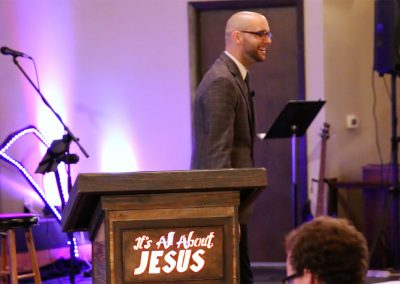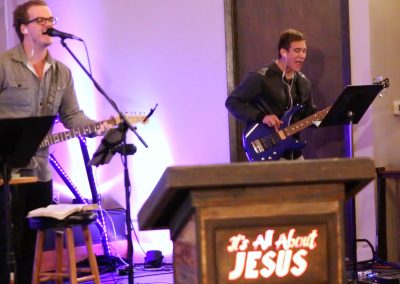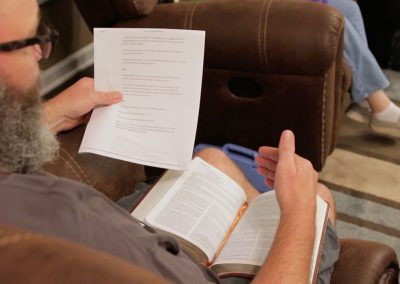Jesus and Germs | Matthew 6:25-34
In the state of our current events we are seeing panic and fear dominate our society. From the recent uptick of the flu in our area as well as COVID-19 (Coronavirus) being declared a pandemic by the World Health Organization, we are presented with a lot of things to be anxious about. Maybe you find yourself in the midst of panic, fear and anxiety.
Jesus offers us good news in these trying times in Matthew 6:25-34. Jesus shows us that fear and anxiousness aren’t obstacles, but opportunities. What does this mean? How does this play out in my life?
Join us in Matthew 6:25-34 as we seek to find peace in a time of panic in the only person that can offer it, Jesus Christ.
It’s all about Jesus

Date: March 15, 2020
Speaker: Jason Jordan
Series: Stand Alone
Watch the archived Facebook LIVE stream by clicking the button below!
Pastor’s Comment
Thank you so much for listening in here at West Side. We often say that we love the word of God because it points us to the son of God. We hope these messages encourage you and equip you to love Jesus more. We also want you to be apart of a local church, we believe these messages are only supplemental, being apart of a local church is essential. Blessings.
Sermon Notes
“Jesus and Germs” Matthew 6:25-34
INTRO> On Friday, March 13th (crazy!) Donald J Trump President of the United States declared a state of emergency. A Few hours later, the governor of the state of Missouri, governor Parson declared a state of emergency in the state of Missouri. All of this due to the, certified by the World Health Organization, a pandemic from the COVID-19 or the “Coronavirus”. The word Coronavirus was mentioned over 10 million times in a single day on social media, the stock market crashed then was back up then back down again. The phrase COVID-19 or Coronavirus on average in mentioned every 2 seconds on the news. The thing that is spreading even faster than the virus? Is the fear, panic and anxiety based around this pandemic. We can thank William A. Hammond, who gave us the term, “Mysophobia” better known as “Germaphobia”.
APP> In a time like this as your pastor, I heed the advice from the great theologian Karl Barth, who told pastors that sometimes “You have to preach with a Bible in one hand and a newspaper in the other… but use the Bible to interpret the news paper.”
Examining a State of Emergency:
-
-
- Resets our lives.
- Reminds us of our mortality.
- Removes our control.
- Reveals either panic or passivity.
- Revives the Church.
- Repent of sin. “There were some present at that very time who told him about the Galileans whose blood Pilate had mingled with their sacrifices. And he answered them, “Do you think that these Galileans were worse sinners than all the other Galileans, because they suffered in this way? 3 No, I tell you; but unless you repent, you will all likewise perish. 4 Or those eighteen on whom the tower in Siloam fell and killed them: do you think that they were worse offenders than all the others who lived in Jerusalem? 5 No, I tell you; but unless you repent, you will all likewise perish.” Luke 13:1-5
-
CONTEXT> In our passage Jesus addresses anxiety head on. he uses the word 6x in these verses. I want to be brief and I want to helpful.
- What anxiety looks like. v25
-
-
-
- “Therefore I tell you, do not be anxious…” Jesus makes himself pretty plain here. Each time he uses a particular word for “anxious or worry” its the greek word μεριμνάω or merimnáō which means “to care for or be divided over”
-
-
APP> We are created in the image and likeness of God, God has given us bodies and out bodies are absolutely the tell all when it comes to anxiety. Sleep, too much, not enough. Eating. APP> Stress in the mind shows itself in the body.
-
-
-
- I Think Jesus actually defines what this looks like for us in the very last verse. “Therefore, do not be anxious about tomorrow, for tomorrow will be anxious for itself. Sufficient for the day is it’s own trouble.”
-
-
APP> Anxiety is taking a future possibility and making it a present reality.
APP> There is a difference in carrying about it and careering it.
2) When anxiety enters.v26-33
-
-
- I think Jesus gives us two primary sources as to where this can come from.
-
- Wrong perspectives. “Look at the birds.. Consider the lilies..” In both of these verse’s Jesus uses a very strong word that get’s missed. It’s the greek word emblepō “which means to look at with the mind” … oh man! APP> It’s not about over-thinking or not thinking but rather about right thinking. “You keep him in perfect peace whose mind is stayed on you, because he trusts in you.” Isiah 26:3
- Wrong priorities. “Seek first the kingdom of God…” Jesus tells us that when worry and anxiety enter in It’s because we are seeking and pursuing things that aren’t stable, they collapse. *ILL> Sand, ball and container. APP> Anxiety is often times a competition of priorities.
3) How anxiety exits.
-
-
- There is a constant thread through out this whole passage, it’s a big doctrine in the Bible that we call “The Sovereignty of God.”
- “From him and through him and to him are all things” Romans 11:36
- The Sovereignty of God is the biblical teaching that all things are under God’s rule and control, and that nothing happens without His direction or permission.
- “And we know that for those who love God all things work together for good, for those who are called according to his purpose.”
-
APP> “I know” always beats “What if”.
What do we know?
- God provides. v26-28
- God knows v32
- God cares v32
Big Idea> The anchor of God’s sovereignty is the answer to your anxiety.
CS Lewis lived during the atomic bomb age. He wrote these words 72 years ago in response and they ring very true today:
“In one way we think a great deal too much of the atomic bomb. “How are we to live in an atomic age?” I am tempted to reply: “Why, as you would have lived in the sixteenth century when the plague visited London almost every year, or as you would have lived in a Viking age when raiders from Scandinavia might land and cut your throat any night; or indeed, as you are already living in an age of cancer, an age of syphilis, an age of paralysis, an age of air raids, an age of railway accidents, an age of motor accidents…..This is the first point to be made: and the first action to be taken is to pull ourselves together. If we are all going to be destroyed by an atomic bomb, let that bomb when it comes find us doing sensible and human things—praying, working, teaching, reading, listening to music, bathing the children, playing tennis, chatting to our friends over a pint and a game of darts—not huddled together like frightened sheep and thinking about bombs. They may break our bodies (a microbe can do that) but they need not dominate our minds.
— “On Living in an Atomic Age” (1948) in Present Concerns: Journalistic Essays





